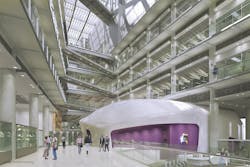SCIENCE + TECHNOLOGY GIANTS: Incubator model is reimagining research and lab design
When the Francis Crick Institute opens this summer, in London, it will be the quintessence of the future direction of science and technology facilities.
TOP 40 SCIENCE + TECHNOLOGY ARCHITECTURE FIRMS
Rank, Firm, 2015 Revenue
1. Perkins+Will $60,040,000
2. HDR $56,664,000
3. HOK $50,435,000
4. Payette $35,458,760
5. Stantec $34,755,593
6. Flad Architects $29,730,000
7. SmithGroupJJR $26,205,000
8. DGA $21,133,997
9. Page $19,500,000
10. ZGF Architects $18,405,848
TOP 30 SCIENCE + TECHNOLOGY CONSTRUCTION FIRMS
Rank, Firm, 2015 Revenue
1. Skanska USA $461,469,485
2. Suffolk Construction Co. $307,964,240
3. Whiting-Turner Contracting Co., The $141,886,037
4. JE Dunn Construction $100,808,913
5. Turner Construction Co. $91,930,708
6. Gilbane Building Co. $52,712,000
7. DPR Construction $40,625,000
8. Jacobs $24,060,000
9. Sundt Construction $23,322,783
10. Hill & Wilkinson General Contractors $21,132,000
TOP 50 SCIENCE + TECHNOLOGY ENGINEERING FIRMS
Rank, Firm, 2015 Revenue
1. Jacobs $51,420,000
2. Affiliated Engineers $29,447,000
3. Vanderweil Engineers $21,653,900
4. CRB $10,200,000
5. RMF Engineering $6,285,000
6. Mazzetti $5,199,075
7. Thornton Tomasetti $4,686,534
8. Newcomb & Boyd $3,466,430
9. Rist-Frost-Shumway Engineering $3,335,000
10. Global Engineering Solutions $3,275,000
The 980,000-sf, $931 million facility is the result of a unique financing mechanism that brought together three of the U.K.’s heaviest funders of biomedical research—the Medical Research Council, Cancer Research UK, and the Wellcome Trust—and three leading universities—University College London, Imperial College London, and King’s College London.
“The Crick,” as it’s known, is organized into four “laboratory neighborhoods” that encourage multidisciplinary interaction among its 1,500 scientists. Offices and labs have floor-to-ceiling glazing. The facility is designed around two atria that allow visibility throughout the building and between floors.
The design emphasizes communal space by enabling people to peer into multiple floors, according to Larry Malcic, AIA, LEED GA, SVP/Design Principal in the London office of HOK, which designed the lab. The idea, he said, is to “put science on display and promote collaboration.”
Projects like The Crick practically force scientists, engineers, and technicians from disparate fields to interact. “Things are happening between disciplines now, and there are a lot more buildings with oddball combinations of sciences,” says HDR Design Principal Dan Rew, AIA, LEED AP.
The state of Maryland’s $180 million Public Health Lab, which opened last year at Forest City’s Science Park, in Baltimore, exemplifies this pattern. HDR provided architectural and engineering services for the five-story, 200,000-sf lab, which does testing, consulting, and offers regulatory support related to infectious disease, epidemiology, environmental, and regulatory public health issues.
The open-lab concept allows operations to scale up and mobilize quickly in the event of an emergency, says HDR VP Warren Hendrickson, AIA, LEED AP BD+C. The ground floor, where first responders train, is visible from the street. The building is also linked to the Centers for Disease Control and Prevention.
In Seattle, the 270,000-sf headquarters of the Allen Institute is programmed for team science, says Kay Kornovich, RA, LEED AP, NCARB, Managing Director, Perkins+Will, Seattle. She says the institute wanted to break down walls between “carpet” people (managers) and “vinyl” people (researchers).
The building, which opened last December, focuses on brain and cell sciences. It is organized in a series of “petals” grouped around a six-story atrium. Cantilevered into the atrium are glass-walled collaboration pods outfitted with comfortable seating and whiteboards. “In any part of the building, you can see science and meetings going on,” says Kornovich.
Saving money can be the impetus for combining disciplines and buildings. Shepley Bulfinch’s design for the University of Houston’s Health and Science Building II connects the nine-story, 300,000-sf structure to H&S Building I. This will allow them to share loading docks, animal care facilities, and expensive equipment like NMR machines, says Luke Voiland, AIA, LEED AP, Principal in the firm’s Houston office.
“Clients are trying to do more with less, like bringing physics and engineering departments together,” adds Ed Burton, SmithGroupJJR’s S+T National Practice Leader. He points to the $80 million, 136,500-sf Senator Daniel K. Inouye Defense POW/MIA Accounting Agency Center for Excellence, which opened last September at Joint Base Pearl Harbor–Hickam, in Oahu, Hawaii. The lab consolidates operations that had been spread out over three military installations.
Some S+T facilities are incorporating business development into their objectives. Half of the space in the H&S building at the University of Houston will be used to train future pharmacists, and the other half for drug discovery research. This trend might explain why computational, simulation, and STEM labs are all the rage now. “The incubator mentality is creeping into labs,” says HDR’s Rew.
Last September, Skidmore, Owings & Merrill, in collaboration with the U.S. Energy Department’s Oak Ridge National Laboratory, completed the 210-sf Additive Manufacturing Integrated Energy demonstration project. AMIE 1.0 is a 3D-printed building designed to produce and store renewable power and share energy wirelessly with a 3D-printed vehicle developed by the DOE. The project aimed to demonstrate the use of bidirectional wireless energy technology and high-performance materials to achieve independence from the power grid at peak-demand periods.
Philip Enquist, FAIA, SOM’s Partner in Charge of Urban Design and Planning, sees AMIE 1.0 as “the beginning of a new chapter” in building for a resilient future.
Leo A Daly is working on the Emergent Technologies Institute, located on 6.5 acres of Florida Gulf Coast University’s campus, in Fort Myers. Public and private researchers will develop and test wind, solar, and agricultural technologies at this 24,600-sf incubator lab.
“We designed an infrastructure that provides a backbone for research, but remains adaptable to the academic and business communities’ needs,” says Robert Thomas, AIA, LEED AP, Leo A Daly’s Principal of S+T.
